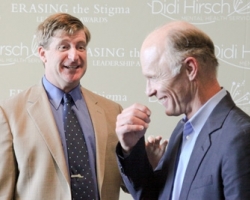
On Friday, Didi Hirsch Mental Health Services presented its annual Erasing the Stigma Leadership Awards to two men striving to draw awareness to mental illness and drug and alcohol abuse. The awards, presented at the Beverly Hilton Hotel in Beverly Hills, were given to former Rep. Patrick J. Kennedy and comedy pioneer Jamie Masada.
The theme of this year’s event was “family.” Emcee Christine Devine of Fox 11 News introduced Event Chair Gail Kamer Lieberfarb, who asserted that, “Families pulling together can make all the difference.”
Didi Hirsch CEO Dr. Kita Curry, Ph.D., explained that when one person suffers from mental health problems that person’s whole family also suffers. She asked everyone to stand whose lives had been affected by the mental health issues of a family member. In a room of 500 people, few chairs remained occupied.
Curry spoke, often with personal examples, about the difficulties associated in eradicating the stigmas surrounding mental health issues. “Stigma comes from prejudice and misinformation,” she said. “We must live openly and work openly among people who fear us.”
“Psychology told me that I’m damaged goods,” she said, later adding, “Let’s concentrate on the goods, not the damage.”
Mental health advocate Garen K. Staglin introduced Kennedy and presented him with the award. A rapt audience sat attentively as Kennedy recalled the “We choose to go to the moon” speech delivered by his uncle, President John F. Kennedy, 50 years earlier. The former Rhode Island Democrat then tied the speech to the present-day situation in which the frontier in need of exploration is not outer space, but inner space. His Next Frontier campaign is attempting to explore the uncharted realms of the brain.
Kennedy seemingly embodied the spirit of the event – a leader who has been open about the effect of mental illness and substance abuse on entire families. A self-described recovering alcoholic who suffers from bipolar disorder, he was the chief sponsor of the 2008 Mental Health Parity Act, a bill requiring healthcare providers to treat mental illnesses the way physical illnesses are treated. He warned that the only thing that would prevent its goal was “not fighting to implement it.”
Veterans, he claimed, deserve and are in urgent need of mental health treatment. “Many may have come home healthy in body, but not in mind,” he said. In an interview with the News, Kennedy employed the moonshot analogy: “Sputnik is the suicides of our veterans.”
He pointed out that there are myriad foundations seeking to cure particular disorders like Alzheimer’s disease or alcoholism, but that by working cooperatively to fully understand the brain, we may eventually be able to solve all mental illnesses. “A basic understanding of the brain will accrue to everyone’s advantage,” he said.
The other Leadership Award recipient was Masada, who founded The Laugh Factory and continues to operate the comedy club. He referred to comedians as “doctors of the soul,” but also recognized that comedians, many of whom struggle with drugs, alcohol, depression and other mental health issues, need access to a professional psychologist. So he hired a one. More than 80 comedians have since sought help.
Also receiving awards were filmmakers Logan and Noah Miller, twin brothers who wrote, directed and produced 2010’s Touching Home, a true story about their homeless alcoholic father, who died in jail.
The film is “incredibly moving” and “shows the importance of never giving up on someone,” Curry said.
Presenting the Miller brothers with the Beatrice Stern Media Award was actor Ed Harris, who played their father in the movie. “These two guys – their love for their dad really defined unconditional love,” he said.
“We all suffer in some way,” Harris said. “People who have mental problems – it’s not their choice.”
“The disorders in our brains are as immutable as the color of our skin,” Curry said.
Harris, a long-time friend of Curry, said he visited the Didi Hirsch Mental Health Services Center in Culver City and “got really emotional.” He said he discovered “people who actually gave a damn.”
One of the brothers speculated that “if there had been an organization like Didi Hirsch our father had connected with, he might still be alive.”
For more information about Didi Hirsch Mental Health Services, go to DidiHirsch.org.
